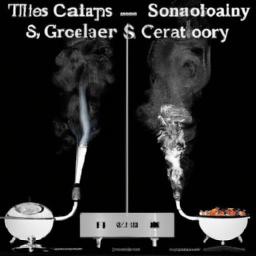Finding the Ideal Smoker: A Complete Guide to Gas, Electric, and Charcoal Options
Choosing your perfect smoker often feels like stepping onto a smoky battlefield. Between gas, electric, and charcoal smokers, each promises delicious results but varies significantly in operation, flavor, and convenience. So, how do you decide which fits your cooking style and palate best?
At How To Cook Gourmet, we thrive on culinary discussions, especially when they revolve around smoky flavors. Let’s dive into what sets these smokers apart, their perks and drawbacks, and how they align with your backyard grilling goals.
1. Gas Smokers: Streamlined Ease with a Gentler Smoke
Gas smokers appeal to those craving simplicity and control. Just twist a knob, and you have a steady, reliable heat source with minimal fuss. They rarely flare up and maintain consistent temperatures, making them especially beginner-friendly.
However, this convenience comes with a trade-off: the smoke flavor is usually milder and less complex than what you might get from wood or charcoal. If you’re after a nuanced smoky depth, gas smokers might feel a bit reserved.
| Aspect | Gas Smoker | Flavor Influence |
|---|---|---|
| User-Friendliness | Extremely simple, “set and forget” style | Less intricate smoky layers |
| Heat Regulation | Accurate and steady | Consistent but low char intensity |
| Smoke Profile | Light and subtle | Lacks boldness and richness |
| Cleanup Task | Relatively straightforward | Less residue and mess than charcoal |
- Excellent for cooks wanting speedy, hassle-free sessions.
- Flavor remains on the modest side, potentially underwhelming for smoke purists.
- A highly practical choice for busy schedules.
In summary: do you prize effortless operation over intense smoky character? Gas smokers excel at the first but come up light on the latter.
2. Electric Smokers: Effortless Precision Meets Accessibility
Electric smokers operate like a wizard’s assistant-you set the temperature, add wood chips, and the device autonomously manages the smoking process. This makes them an excellent pick for cooks who want to relax and enjoy the experience without constant supervision.
The precision offered enables long hours of consistent heat. Electric units require fewer hands-on adjustments compared to charcoal and even gas models, alongside an easier cleanup routine.
| Feature | Electric Smoker | Charcoal Smoker | Gas Smoker |
|---|---|---|---|
| Temperature Control | Very precise and easy | Manual and challenging | Moderate ease |
| Cleanup Effort | Quick and simple | Labor-intensive | Average effort |
| Attention Requirement | Low, mostly automated | High, continuous monitoring | Moderate, occasional checks |
| Flavor Management | Good with wood chips | Rich and deep | Fairly subtle |
Even seasoned pitmasters appreciate electric smokers for their low-maintenance performance. If your preference leans toward stress-free cooking with dependable outcomes, electric is a smart option.
3. Charcoal Smokers: The Artful Approach to Bold Smoke
Charcoal smokers are beloved by smoke aficionados for one reason: authentic, robust flavor. They command patience and skill, requiring you to manage fire temperature, air intake, and wood additions continuously. This intimate engagement can turn smoking into a rewarding ritual.
The distinctive flavor emerges from the fat’s interaction with hot coals, releasing flavorful smoke that seeps deeply into meats. The shifting heat levels help build a thick, flavorful bark on cuts like brisket or pork shoulder.
| Charcoal Smoker Advantages | Description |
|---|---|
| Smoky Depth | Intense, earthy aroma with rich bark formation |
| Heat Handling | Fine-tuned manual control for nuanced cooking |
| Experience | Engaging, hands-on process rewarding patience |
| Affordability | Generally budget-friendly compared to others |
But it’s not all easy: steady charcoal smoking comes with workload-stoking, airflow balancing, and guesswork. If you’re up for the challenge, the flavor dividends are substantial.
- Ignite coals evenly for stable, lasting heat.
- Experiment with various hardwood chunks to diversify smoke profiles.
- Keep your smoker’s lid closed to trap flavors and optimize smoke circulation.
- Practice patience-it’s a flavorful slow dance demanding time.
For those who see smoking as both an art and a science, charcoal smokers provide unparalleled satisfaction.
4. Matching Your Smoking Style to Your Personality
Are you a methodical chef who prefers precise control? The gas smoker’s even heat and straightforward operation might be your best ally. Prefer to dive into fire management with a hands-on approach? Charcoal smokers offer a playground of smoky possibilities.
Looking for a blend of convenience and consistent results? Electric smokers provide excellent middle ground-easy to use, less physical work, and reliable heat.
| Type | Ideal User | Primary Drawback |
|---|---|---|
| Gas | Busy cooks valuing precision and speed | Somewhat subdued smoky flavor |
| Charcoal | Flavor fans who enjoy active cooking | High maintenance, smoky residue |
| Electric | Casual chefs wanting minimal effort | Less smoky authenticity |
Ultimately, the ideal smoker complements your cooking habits and patience level, helping you become your backyard’s gourmet champion.
5. Evaluating Fuel Expenses and Time Commitment
Budget and time are key factors in smoker selection. Gas smokers run on propane, with tanks costing roughly $15-$20 each. A single tank can last multiple sessions depending on use duration. Electric smokers primarily incur costs based on your local electricity rates, generally proving the most economical per cook.
Charcoal smokers require regular bags of briquettes or lump charcoal, which can cost around $10 for 10 pounds. However, managing this fuel demands far more hands-on time and attention.
| Smoker | Approximate Fuel Cost Per Use | Smoking Duration (Hours) | Active Management Required |
|---|---|---|---|
| Gas | $2 – $5 | 2 – 6 | Low (occasional checks) |
| Electric | $0.50 – $1.50 | 3 – 8 | Very Low (mostly automatic) |
| Charcoal | $3 – $7 | 4 – 10 | High (constant attention) |
Where does your priority lie-saving fuel and effort or embracing a traditional, immersive cooking experience? Many find the rich flavors of charcoal worth the investment of time and money.
6. Essential Maintenance Tips for Longevity and Flavor
Proper upkeep ensures your smoker performs well season after season. Neglect often leads to uneven heating, safety hazards, or disappointing results.
Gas Smokers
- Clean burner tubes regularly to avoid blockages.
- Inspect propane hoses for leaks or cracks.
- Empty drip trays to prevent grease fires.
Electric Smokers
- Keep heating elements free from dust and ash.
- Maintain and clean water pans frequently to stabilize moisture.
- Unplug and store safely during off-use periods.
Charcoal Smokers
- Remove ash buildup after every session to maintain airflow.
- Conduct routine inspections for rust and structural integrity.
| Smoker Type | Maintenance Needs | Importance |
|---|---|---|
| Gas | Burner cleaning, hose inspection, drip pan emptying | Avoids clogging and flare-ups |
| Electric | Heating element upkeep, water tray cleaning | Retains steady heat & smoke quality |
| Charcoal | Ash disposal and ventilation checks | Ensures proper temperature management |
Regular care translates to consistent cooking joy and longevity of your gear.
7. Weather’s Role in Smoker Performance
Mother Nature influences every grilling session. Wet, windy, cold, or exceptionally hot conditions can impact temperature control and cooking consistency.
| Weather Condition | Gas Smoker | Electric Smoker | Charcoal Smoker |
|---|---|---|---|
| Rain | Handles well with a sturdy cover | Needs dry plan and electrical caution | Wet charcoal hinders combustion |
| Wind | Stable heat despite breezes | Fair wind tolerance, no open flame | Wind disrupts heat and scatters ash |
| Cold | Consumes more fuel but controlled | May struggle to maintain warmth | Slower burn, requires extra tending |
| Heat | Temperature regulation remains easy | No flare-ups, performs smoothly | Risk of overheating, flare control needed |
If you face frequent weather variability, gas smokers generally provide the most resilience, while charcoal’s traditional charm requires patience and preparation. Electric smokers fall in between but need reliable power and shelter.
8. Pairing Smoker Styles with Food for Flavor Perfection
Matching your smoker to the food you’re cooking elevates every meal. Here’s how each smoker typically enhances different dishes:
- Gas Smokers: Best for lean proteins like chicken breasts, fish fillets, and vegetables. Their clean heat preserves delicate flavors with light smoky undertones.
- Electric Smokers: Ideal for long cooks such as briskets, ribs, and pork butt where consistent, low-and-slow heat is vital without demanding active management.
- Charcoal Smokers: Perfect for hearty cuts like steak, pork shoulder, and game meats that soak up intense smoky aromas and develop rich, textured bark.
| Smoker Type | Food Matches | Flavor Characteristics | Ease of Use |
|---|---|---|---|
| Gas | Chicken, fish, vegetables | Subtle, clean smoke | Simple to adjust |
| Electric | Brisket, ribs, slow roasts | Gentle, consistent smoke | Minimal supervision |
| Charcoal | Steak, pork shoulder, bold meats | Robust, deep smoke | Requires constant attention |
Selecting the correct smoker-food pairing maximizes flavor potential and eases the cooking process.
9. Frequently Asked Questions: Gas vs Electric vs Charcoal Smokers
- Q: Which smoker suits beginners best?
- Electric smokers top the list for beginners-plug in, set temperature, and relax. Gas smokers require some propane flame management, while charcoal demands skill and focus.
- Q: Which delivers the richest flavor?
- Charcoal smokers reign supreme in imparting deep, smoky profiles. Gas provides a more subtle smoke taste, and electric units offer the mildest flavor.
- Q: How do costs compare?
- Generally, electric smokers have low running costs, gas is moderate, and charcoal usually involves higher fuel consumption and time, reflected in cost.
- Q: Time commitment differences?
- Charcoal smoking requires the longest, hands-on time. Electric is mostly hands-off with longer cook times. Gas smokers heat quickly but still need occasional monitoring.
- Q: Are all types safe to use?
- Electric smokers are safest due to no open flame. Gas requires care with propane. Charcoal carries higher risk due to hot coals and flare-ups.
- Q: Which smoker is most portable?
- Charcoal smokers are generally lighter and more mobile. Gas smokers can be heavier due to fuel tanks. Electric smokers need proximity to power sources limiting portability.
- Q: Who should choose which smoker?
- If you love experimenting and hands-on control, charcoal is ideal. For steady consistency with low fuss, electric works well. Gas offers a balance of control and ease.
10. Final Thoughts: Selecting Your Smoking Companion
After weighing gas, electric, and charcoal smokers, what suits your culinary journey? Gas is speedy and precise. Electric offers consistent, stress-free operation. Charcoal delivers a hands-on adventure with unmatched smoky depth.
| Smoker Type | Control Simplicity | Depth of Flavor | Setup Time | Best For |
|---|---|---|---|---|
| Gas | Easy | Medium | Short | Busy cooks & beginners |
| Electric | Very easy | Light | Very short | Low-effort cooks |
| Charcoal | Moderate | Deep | Long | Flavor lovers & hands-on chefs |
Remember, the best smoker is the one you want to use repeatedly, enjoying both the process and the results. At How To Cook Gourmet, we encourage exploring all options to find your perfect smoky rhythm.
Here’s to fantastic feasts and flavorful memories-happy smoking!





